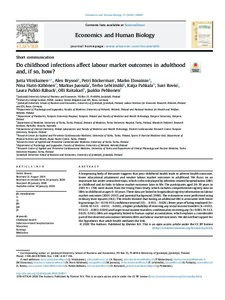Do childhood infections affect labour market outcomes in adulthood and, if so, how?
Viinikainen J; Raitakari O; Pahkala K; Juonala M; Böckerman P; Bryson A; Pehkonen J; Pulkki-Råback L; Elovainio M; Rovio S; Lehtimäki T; Hutri-Kähönen N
Do childhood infections affect labour market outcomes in adulthood and, if so, how?
Viinikainen J
Raitakari O
Pahkala K
Juonala M
Böckerman P
Bryson A
Pehkonen J
Pulkki-Råback L
Elovainio M
Rovio S
Lehtimäki T
Hutri-Kähönen N
ELSEVIER
Julkaisun pysyvä osoite on:
https://urn.fi/URN:NBN:fi-fe2021042823023
https://urn.fi/URN:NBN:fi-fe2021042823023
Tiivistelmä
A burgeoning body of literature suggests that poor childhood health leads to adverse health outcomes. lower educational attainment and weaker labour market outcomes in adulthood. We focus on an important but under-researched topic, which is the role played by infection-related hospitalization (IRH) in childhood and its links to labour market outcomes later in life. The participants aged 24-30 years in 2001 N =1706 were drawn from the Young Finns Study, which includes comprehensive registry data on IRHs in childhood at ages 0-18 years. These data are linked to longitudinal registry information on labour market outcomes (2001-2012) and parental background (1980). The estimations were performed using ordinary least squares (OLS). The results showed that having an additional IRH is associated with lower log earnings (b = 95% confidence interval (CI): -0.193; -0.026). fewer years of being employed (b = -0.018. 95% CI: -0.031; -0.005). a higher probability of receiving any social income transfers (b = 0.012, 95 % CI: -0.002; 0.026) and larger social income transfers, conditional on receiving any (b = 0.085,95 % CI: 0.025; 0.145). IRHs are negatively linked to human capital accumulation. which explains a considerable part of the observed associations between IRHs and labour market outcomes. We did not find support for the hypothesis that adult health mediates the link. (C) 2020 The Authors. Published by Elsevier B.V.
Kokoelmat
- Rinnakkaistallenteet [19207]
